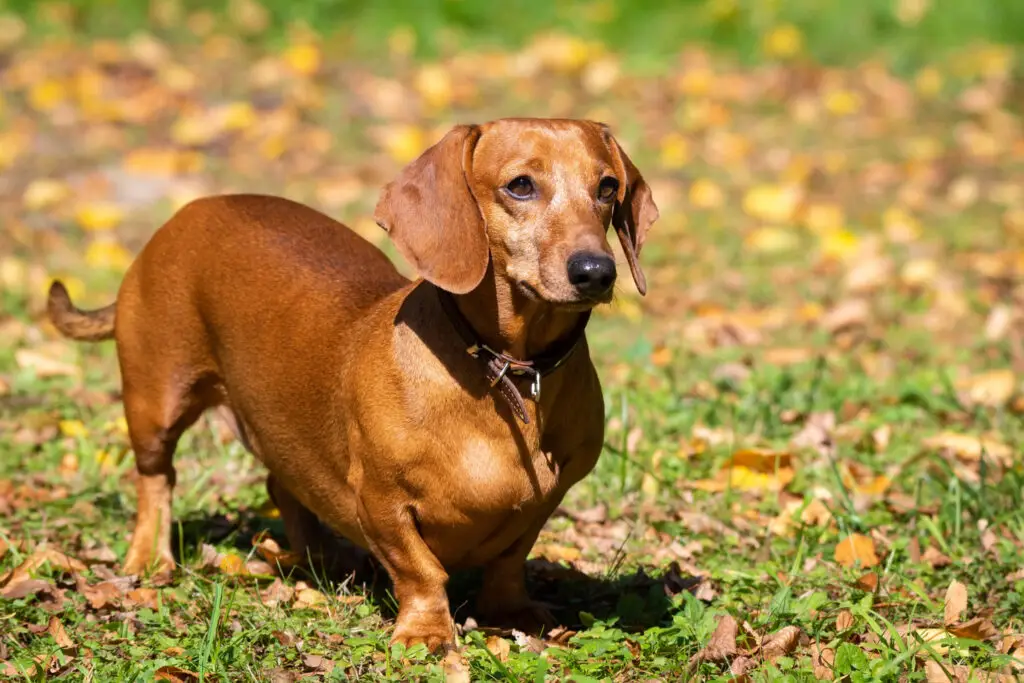Dachshunds Dogs are bold, curious, and fiercely loyal. These inspiring “sausage dogs” were originally bred in Germany for badger hunting, which defines their brave nature and strong prey drive. With their playful eyes and fearless nature, Dachshunds are nothing short of unforgettable. With their long bodies, short legs, and expressive eyes, these little dogs pack a ton of personality into a small frame.
While they might surprise you with a stubborn streak or aptitude for digging, they more than make up for it with charm and devotion. Living with a Dachshund can be a mix of laughter, loyalty, and the occasional stubborn standoff. These dogs are full of personality and known for being just a bit bossy but that’s part of the fun. They’re affectionate with their people, surprisingly alert, and always up for a nap under a blanket.
Let’s explore why Dachshund Dogs remain one of the UK’s most loved breeds.
Table of Contents
ToggleUnderstanding Dachshund Dogs: Origin & Popularity
Dachshund Dogs originated in Germany over 300 years ago and were bred to hunt badgers and other burrow-dwelling animals. “Dachs” means badger, and “hund” means dog in German—making them true to their name.
There are three coat types—smooth, long-haired, and wire-haired—and two sizes: standard and miniature. Their popularity has soared, especially in urban areas, thanks to their compact size, expressive eyes, and charming quirks.
Key Traits of Dachshund Dogs
1. Distinctive Body Structure
Their iconic low-slung, long body and short legs are perfect for digging and navigating tight tunnels. This physique makes them prone to spine issues, so care is needed when handling.
2. Big Personality in a Small Body
Don’t let their size fool you—Dachshund Dogs are confident, independent thinkers with a loud bark and a bold attitude. They’re incredibly alert and often act like watchdogs.
3. Intelligent but Stubborn
Dachshunds are intelligent and eager to learn but can be stubborn, especially when training involves repetition. Positive reinforcement works best.
4. Strong Hunting Instinct
Their hunting lineage makes them natural diggers and chasers. A secure garden and supervision during walks are essential to prevent runaway chases.
Types of Dachshund Dogs
Standard Dachshund
Weighing 7–14 kg, they were originally bred to hunt larger prey like badgers and foxes.
Miniature Dachshund
Smaller in size (under 5 kg), these adorable companions are great for apartments and city living.
Coat Types:
- Smooth Coat: Sleek and low maintenance.
- Long-Haired: Elegant and needs regular grooming.
- Wire-Haired: Rugged coat with a bearded face—playful and energetic.
How to Care for Dachshund Dogs
These scent hounds are small to medium-sized and full of personality. Beagles love adventure and are known for their loyalty and affection. Great for families who enjoy walks and exploration.
Diet & Nutrition
Feed your Dachshund a high-quality, balanced diet. Avoid overfeeding as they are prone to obesity, which increases the risk of back problems like Intervertebral Disc Disease (IVDD).
- Divide meals into two portions per day.
- Use low-calorie treats for training.
- Ensure access to clean water at all times.
Exercise Needs
While small, Dachshund Dogs are surprisingly energetic.
- Daily walks (20–30 minutes).
- Avoid jumping on/off furniture to protect their spine.
- Mental stimulation through toys, puzzles, and scent games.
Grooming
- Smooth coats: Weekly brushing.
- Long-haired: Brush 2–3 times a week to prevent matting.
- Wire-haired: May need occasional trimming or hand-stripping.
- Regular nail trimming, ear cleaning, and dental care are also essential.
Health Checks
Common health concerns include:
- IVDD (disc disease)
- Obesity
- Dental disease
- Patellar luxation
- Eye problems (especially in double dapple variety)
Schedule annual vet check-ups and monitor weight closely.
Training Tips for Dachshund Dogs

They may be small, but they carry a big heart! Cavaliers love snuggles and being close to family members. Their adaptability makes them excellent companions for both active and relaxed households.
Potty Training
Start early with crate training and regular toilet breaks. Reward-based training accelerates learning.
Leash Training
They love to sniff and explore, so train them to walk beside you without pulling.
Socialisation
Expose them to new sounds, people, and pets early on. Well-socialised Dachshunds are less likely to show aggression or fear.
Basic Commands
Teach sit, stay, come, and drop-it using treats and positive praise.
Fun Facts About Dachshund Dogs
- Royal Connection: Queen Victoria loved Dachshund Dogs, calling them “courageous and loyal.”
- TV Stars: Dachshunds have appeared in several TV shows, films, and advertisements thanks to their iconic appearance.
- Smarter Than You Think: Despite their stubbornness, they rank high in problem-solving intelligence.
- Sausage Dog Races: Popular in parts of the US and Europe, these races showcase their speed and spirit—though not officially encouraged.
- Inspiring Art: Picasso owned a Dachshund named Lump, who appeared in several of his paintings.
Are Dachshund Dogs good with children?
Yes, especially if socialised early. Supervision is recommended with very young children due to their delicate backs.
Can Dachshunds be left alone?
They can develop separation anxiety if left alone for long periods. Gradual alone-time training and interactive toys help reduce anxiety.
Are Dachshund Dogs hypoallergenic?
No. While they shed less than some breeds, they still release dander and hair.
Do they get along with other pets?
Yes, if introduced properly. However, due to their hunting instincts, they may chase small animals.
Is a Dachshund Dog Right for You?
Dachshund Dogs are loyal companions with distinct personalities. They’re perfect for those who want a small dog with a big heart and don’t mind a bit of sass. If you can commit to their health needs, regular exercise, and consistent training, you’ll be rewarded with a lifelong best friend.
Remember: their long backs require careful handling and proactive health care. Keep them at a healthy weight, discourage jumping, and always support their rear when picking them up.
Where to Find Dachshund Dogs
If you’re ready to welcome a Dachshund Dog into your life, consider:
- Reputable breeders (check Kennel Club registration)
- Rescue shelters and breed-specific rescues
- Avoid puppy farms—always visit the breeder and ask health-related questions
Conclusion
Dachshund Dogs are full of personality, energy, and love. Despite their size, they bring an enormous amount of joy and charm into any home. From playful antics to cuddly moments, life with a Dachshund is never dull.
Whether you’re adopting a miniature long-haired pup or a standard smooth-coated senior, the key is to understand their needs and give them the best possible care. This guide has covered all essential aspects—traits, care tips, training, and fun facts—to help you form a strong bond with your new best friend.







